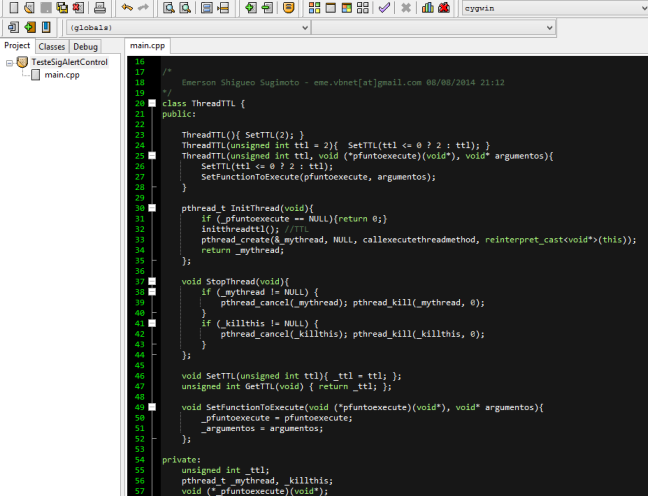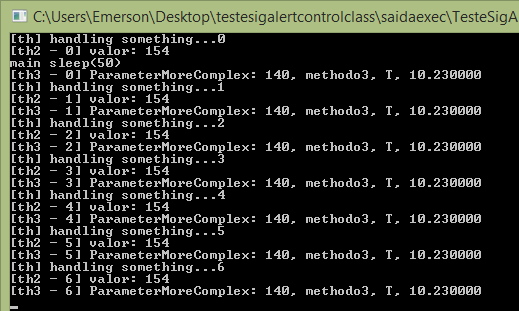Este tutorial tem por objetivo demonstrar o controle de threads em C++ com o uso de uma thread monitora (pthread_t _killthis) em conjunto com o conceito de ‘TTL’ ou Time to Live – tempo de vida da thread. A ideia central é: Execute o meu método (ponteiro de função) em uma thread até que ele termine, ou que, o tempo definido (em segundos) se esgote.
Este artigo envolve conceitos de threads (pthread_t), ponteiros (*), ponteiro de função (void (*pfuntoexecute)(void*)), classes, sleep, parameters do tipo void* (reinterpret_cast…), join de threads (pthread_join), etc, que não serão explicados neste tutorial.
Inicialmente crie um projeto do DevCpp (http://sourceforge.net/projects/orwelldevcpp/) do tipo:
Console > C++
Código da classe main.cpp:
#include <iostream>
#include <stdio.h>
#include <stdlib.h>
#include <errno.h>
#include <string.h>
#include <sys/types.h>
#include <sys/socket.h>
#include <netinet/in.h>
#include <arpa/inet.h>
#include <netdb.h>
#include <sys/ioctl.h>
#include <sys/fcntl.h>
//#include <signal.h> // sigaction(), sigsuspend(), sig*()
#include <unistd.h> // alarm(), sleep
/*
Emerson Shigueo Sugimoto - eme.vbnet[at]gmail.com 08/08/2014 21:12
*/
class ThreadTTL {
public:
ThreadTTL(){ SetTTL(2); }
ThreadTTL(unsigned int ttl = 2){ SetTTL(ttl <= 0 ? 2 : ttl); }
ThreadTTL(unsigned int ttl, void (*pfuntoexecute)(void*), void* argumentos){
SetTTL(ttl <= 0 ? 2 : ttl);
SetFunctionToExecute(pfuntoexecute, argumentos);
}
pthread_t InitThread(void){
if (_pfuntoexecute == NULL){return 0;}
initthreadttl(); //TTL
pthread_create(&_mythread, NULL, callexecutethreadmethod,
reinterpret_cast<void*>(this));
return _mythread;
};
void StopThread(void){
if (_mythread != NULL) {
pthread_cancel(_mythread); pthread_kill(_mythread, 0);
}
if (_killthis != NULL) {
pthread_cancel(_killthis); pthread_kill(_killthis, 0);
}
};
void SetTTL(unsigned int ttl){ _ttl = ttl; };
unsigned int GetTTL(void) { return _ttl; };
void SetFunctionToExecute(void (*pfuntoexecute)(void*), void* argumentos){
_pfuntoexecute = pfuntoexecute;
_argumentos = argumentos;
};
private:
unsigned int _ttl;
pthread_t _mythread, _killthis;
void (*_pfuntoexecute)(void*);
void* _argumentos;
void executethreadmethod(void){
if (_pfuntoexecute != NULL){ _pfuntoexecute(_argumentos); }
StopThread();
};
static void* callexecutethreadmethod(void* args){
ThreadTTL* tth = reinterpret_cast<ThreadTTL*>(args);
tth->executethreadmethod(); return 0;
};
//-- thread kill this
void initthreadttl(void){
pthread_create(&_killthis, NULL, executethreadttl,
reinterpret_cast<void*>(this));
};
static void* executethreadttl(void* args){
ThreadTTL* tth = reinterpret_cast<ThreadTTL*>(args);
sleep(tth->GetTTL()); //TTL
tth->StopThread(); return 0;
};
};
//----------------
// métodos
//----------------
void executesomething(void* args){ //should run for 50s...
for(int i = 0; i < 50; i++) {
printf("[th] handling something...%d\n", i);
sleep(1);
}
}
void executesomething2(void* args){ //should run for 50s...
int* valor = reinterpret_cast<int*>(args);
for(int i = 0; i < 50; i++) {
printf("[th2 - %d] valor: %d\n", i, *valor);
sleep(1);
}
}
//uma struct de parameter
struct ParameterMoreComplex{
int valor1;
std::string str1;
bool t;
float f;
};
void executesomething3(void* args){ //should run for 50s...
struct ParameterMoreComplex* pmc =
reinterpret_cast<struct ParameterMoreComplex*>(args);
for(int i = 0; i < 50; i++) {
printf("[th3 - %d] ParameterMoreComplex: %d, %s, %s, %f\n", i,
pmc->valor1, pmc->str1.c_str(), pmc->t ? "T" : "F", pmc->f);
sleep(1);
}
}
int main(int argc, char *argv[]) {
ThreadTTL* tth = new ThreadTTL(15, executesomething, NULL);
tth->InitThread();
int valor = 154;
ThreadTTL* tth2 = new ThreadTTL(7, executesomething2,
reinterpret_cast<void*>(&valor));
tth2->InitThread();
struct ParameterMoreComplex pmc;
pmc.valor1 = 140;
pmc.str1 = "methodo3";
pmc.t = true;
pmc.f = 10.23;
ThreadTTL* tth3 = new ThreadTTL(8, executesomething3,
reinterpret_cast<void*>(&pmc));
tth3->InitThread();
printf("main sleep(50)\n");
sleep(50); //-- kill if you like with ctrl+c
//pthread_join(thread1, NULL);
return 0;
}
A classe principal que controla o TTL das threads é: ThreadTTL.
A thread pthread_t _mythread é responsável por executar o método definido no ponteiro de função: void (*pfuntoexecute)(void*).
Caso o método do ponteiro de função demore mais do que o TTL definido (em segundos), a thread pthread_t _killthis é responsável por ‘matar’ o processo.
O método void StopThread(void) é responsável por matar as threads _mythread e _killthis.
Exemplo de função a ser passada para o ponteiro de função:
//uma struct de parameter
struct ParameterMoreComplex{
int valor1;
std::string str1;
bool t;
float f;
};
void executesomething3(void* args){ //should run for 50s...
struct ParameterMoreComplex* pmc = reinterpret_cast<struct ParameterMoreComplex*>(args);
for(int i = 0; i < 50; i++) {
printf("[th3 - %d] ParameterMoreComplex: %d, %s, %s, %f\n", i, pmc->valor1, pmc->str1.c_str(), pmc->t ? "T" : "F", pmc->f);
sleep(1);
}
}
Exemplo de chamada na main:
struct ParameterMoreComplex pmc; pmc.valor1 = 140; pmc.str1 = "methodo3"; pmc.t = true; pmc.f = 10.23; ThreadTTL* tth3 = new ThreadTTL(8, executesomething3, reinterpret_cast<void*>(&pmc)); tth3->InitThread();
Como não existe nenhum join das threads (pthread_join), adicione um sleep na sua main, apenas para não matar o processo:
printf("main sleep(50)\n");
sleep(50); //-- kill if you like with ctrl+c
Sugestões e melhorias são bem aceitas. ps: Tentei simular o mesmo efeito com o uso de sigaction + alarm (SO linux), porém devido a assinatura do handler (void(int)) não consegui controlar a área de memória dentro da classe, para matar a thread específica.
Att,
Emerson



